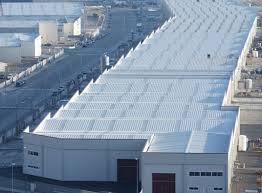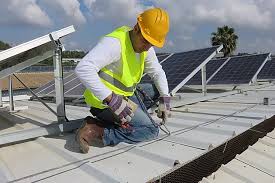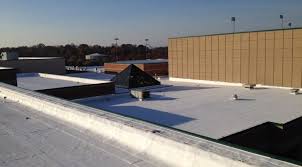What do I need to know about commercial roofing?
What is Commercial Roofing?
Commercial roofing systems and residential roofs primarily have the same function of protecting property. However, they are quite different when it comes to the materials used to build and install them. Commercial roofing systems are typically made up of single-ply (TPO, PVC, EPDM), concrete, modified bitumen, built-up roofing system, tar and gravel, and more. Depending on the weather conditions, residential roofs are typically made of asphalt shingles or concrete tiles.
Since more options are available for commercial roof systems as compared to residential roofs, you need to research well and choose a reliable contractor who offers extensive commercial roofing services so you can get assured results.

How long should a commercial roof last?
As with most things in life, the short answer to this question is, “it depends.” It’s true that no two commercial roofs are exactly alike, even if they’re made from similar materials. This is because no two commercial buildings or businesses are identical, and the daily activities that take place in your unique business can affect your roof and its lifespan.
For example, if you run a busy restaurant, you likely discharge oil and fat residues from cooking through your ventilation system, which is often located on your building’s roof. If your roof is not made with a thermoplastic membrane material like TPO or PVC that is highly resistant to these substances, you could be damaging your roof – and shortening its lifespan – without even realizing it.
Different roofing materials have different average lifespans, usually between about 10 and 50 years. Typically, single-ply membrane systems (TPO and PVC mentioned above, as well as EPDM), which are some of the most popular for flat roof installations today, are made to last from between 15-30 years.
Additional factors affect your roof’s health and lifespan, too. These include the climate and weather conditions common to your location and whether your roof was installed correctly to begin with. Want to be sure that your roof has the longest possible life? Seasonal inspections and maintenance will be necessary.

Installing a Commercial Roof
Installing a commercial roofing system is very different than a residential roofing installation. Most notably is the amount of time it takes to install the roof. Most residential roofing jobs can be completed in a day or two, while it can take a month or more to install a commercial roof. Since commercial buildings are usually larger than homes, this sheer size of the roof plays into this additional installation time. Not only that, but commercial roofing systems are often more difficult to install because they involve complex installation procedures. A lot of this time is spent waiting for the materials to cure, settled, dry, etc.
Repair and Maintenance of Commercial Roofing Systems
When it comes to fixing common roofing problems, commercial repairs are much different than residential repairs. Typically, all it takes is a patch to repair a residential roof leak. But with a commercial roof, a leak could mean the entire roof needs to be repaired, such as adding a coating. Sometimes, a patch or new flashings will fix the problem, but there are often times the leak indicates a bigger problem that may require the roof to be replaced.
Always keep in mind that commercial roofing repairs are different than residential roofing repairs. With a commercial roof, you will typically have different problems than you would with a residential roof. And when you do have similar problems, the repair is often much different.
Bottom line: throw away all you have learned about residential roofing systems when you are researching commercial roofing systems and solutions. Most of the things you have learned about residential roofing are different than commercial roofing. The maintenance, service, and repairs of commercial roofs are different than residential roofs. The available systems and installation process is much different in commercial roofs.

You Need the Right Type of Roof
Since commercial roofs are much bigger than residential roofs, there isn’t much room for mistakes or errors. To put it simply – if you choose the wrong material, or a cheaper solution for your roof, you are going to wind up paying for it down the road. Before making a decision, be sure to know all the options and explore the pros and cons for each one. When thinking long term, it is best to choose reliability and durability over price in any equation.
Always Hire a Professional
Again, it will pay to spend more and get an opinion from a professional. Even if the issue is just a small leak, or something that you think is a smaller repair, it is never a good idea to allow someone with no experience to attempt and fix the roof. Small issues will quickly become bigger ones if they aren’t fixed properly the first time, or if the real cause of the problem isn’t addressed. If this happens, it won’t only cost you more, but also your business. Prior to hiring anyone, ensure they have the license, insurance and experience needed to handle the job.
Manufacturer’s Warranty
Most commercial roofing is backed by either full or pro-rated warranties against manufacturing defects and, occasionally, installation errors. Make certain you know what is covered and for how long.
Make Sure to Maintain Your Roof
In the majority of situations, the costliest issue you are going to encounter is not maintaining your roof. If you don’t invest in regular inspections, then you are going to miss signs of damage and the need for repairs. If you want to make sure this is done right, you have to hire a professional roofing contractor who knows how to check the condition of every component of your roof.